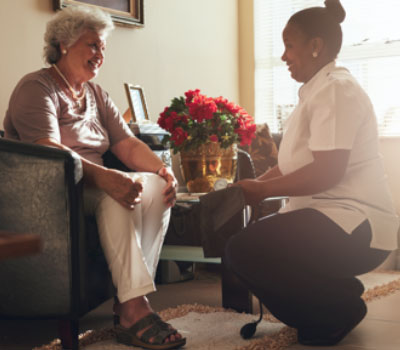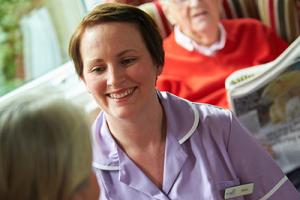A state-of-the-art medical device with unique innovative pain assessment technology is helping staff at Orchard Care Homes identify if…
From good to outstanding: how to improve your care home’s CQC rating
Getting an outstanding Care Quality Commission (CQC) rating can sometimes seem unattainable, especially given the current challenges faced by social care in the UK. From staff shortages, an ageing population and the need for keeping up with emerging technological advancements, it goes without saying that there is a lot of demand in this industry.
Despite the challenges being faced within this sector, the CQC has found that improvements relating to care home ratings are being made. Blueleaf has summarised the behaviours and practices in place at some of the top care providers in the UK to offer advice and actionable tips on how to be rated Outstanding, as well as the benefits this title comes with.
The benefits of being ‘outstanding’
Services that are rated outstanding perform exceptionally well - this is what differentiates them from good services which perform well, but only meet rather than exceed expectations.
In a recent CQC report, one care home was compared to a 5-star hotel and this level of service should be at the forefront of your mind when you are working towards an outstanding rating.
Making the extra effort to achieve an outstanding CQC rating is worthwhile for many reasons. Boosting staff morale and enhancing levels of absenteeism are among the most important reasons. So is staff retention rate. Recognition is the key to retaining staff - by recognising and rewarding hard work, your workers will feel valued. Feeling valued, recognised and respected is within some of the top reasons for employers staying at their current place of work, so is definitely an aspect to take advantage of.
By having an outstanding rating it will also become easier to recruit top talent to look after the people in your care homes. It is clear that employers within this sector are struggling to find, recruit and retain suitable people to the sector and within specific roles. As your reputation for excellence grows, people will be more likely to choose you to take care of their loved ones.
Don’t overlook the importance of good leadership
No matter what industry you work within, you cannot underestimate the effect good leadership can have on making changes to the level of service provided. Good leaders can make a difference to the culture in a place by being approachable, so staff feel comfortable raising concerns with them allowing them to carry out their core tasks more effectively.
In fact, in a recent report from the CQC, leadership was highlighted as one of the underlying reasons for care providers achieving an outstanding rating. The report stated “services that improve tend to have leaders who are visible and accountable to staff, promote an open and positive organisational culture, and engage effectively with partners.”
Top CQC rated care homes were also shown to have leaders who were committed to continually improving their service, despite already performing well.
In the good and outstanding care guide, leaders at outstanding care providers were said to:
● Have a strong, visible person-centred culture
● Deliver stretching but realistic objectives
● Involve people in shaping the service; from recruitment to making developments
● Strive for excellence and seek out the latest best practice and new technologies
● Be externally recognised and work collaboratively with other services
● Take pride in your workforce
Staff are any organisations biggest asset and are invaluable when it comes to identifying how improvements can be made.
To help shape your service, staff should know the details of your CQC reports - not just the overall rating - and they should understand inspection criteria. So, transparency and decent internal communications is pivotal. Staff should also feel confident about the inspection process and explaining what they do at any time - not just when a CQC visit is imminent.
As well as feeling recognised and valued, career growth, learning and development is an important factor amongst talented employees. Investing in staff training should therefore never be deprioritised, even when resources are stretched. To allow carers to provide unrivalled levels of care, they need to be given time to work on developing their expertise. In some cases, this might mean going into a clinical setting to refresh their skills, for example.
You can’t get outstanding CQC ratings without giving staff the support and training they need to do their job effectively. Inspectors are likely to ask staff questions about:
● What their role involves
● Their length of service
● The recruitment and induction process
● How their learning is kept up to date
● How supported they feel
They may also check their understanding of safeguarding, dignity and respect, feedback, complaints and recording incidents.
Focus on the importance of caregiving
Unfortunately, when pressures are high and staff levels are low, the people being cared for might not be given the attention they deserve. It can be hard to give each person individualised care when you are rushed off your feet due to being understaffed. However, this is exactly what outstanding care providers need to do. Work on recruitment, recognition and retention.
Staff need to be given the time to get to know the people they care for and build a relationship with them. It is important that they also have time to speak and listen to the family or advocates of the people they care for.
For each person they care for they should ask:
● What are their likes and dislikes?
● What are they passionate about?
● What is their background?
● What is important to them?
● What is likely to upset them?
● Do they have cultural or religious needs?
● Do they have dietary preferences?
Take advantage of modern technology
Software solutions have allowed for digitisation of records including care plans, residents’ medical records, and staff employment and management records. This has led to the optimisation of operational and administrative processes in UK care homes. Systems such as eMar have played a large role in reducing the pressure on staff within care homes by providing a faster and more efficient way of recording resident information.
Whilst eMar manages medication administration processes, there are several types of software solutions that care homes can invest in which will speed up administrative tasks such as day-to-day care planning, budgeting, staff rostering and supply chain management; allowing for a more efficient business model and enhanced care for patients.
By adopting relevant software solutions, in addition to providing an enhanced quality of care to clients, efficiency and productivity will be improved through enhanced communication.
Joanne Charnley, National Care Advisor at Bluebird Care said: “Communication is key. Typically our care teams have mobile phones, which helps us to keep them regularly informed. Care plans are accessible via an app on their phones and can be instantly updated.”
Build a community, not a corporate institution
Building a community rather than an institutional feel also helps make people more confident. Mary-Jane Hoyle, a registered manager at the Westwood Care Group, said: “We are a home-based upon the principles of family life, there is no staff room as we all eat together to reduce the risk of a staff/client divide. Members are encouraged to be involved in all activities of daily living from cleaning their rooms to laundering their clothes.”
Some of the services rated outstanding by the CQC were commended for making positive memories for people and their families. One care home run a scheme where people were asked what they’d like to achieve during the year. When one person said they’d like to see Elvis, the registered manager arranged for an Elvis impersonator to perform.
These examples of carers going above and beyond to meet people’s needs truly exemplify outstanding care; and should be something your staff strive for.





